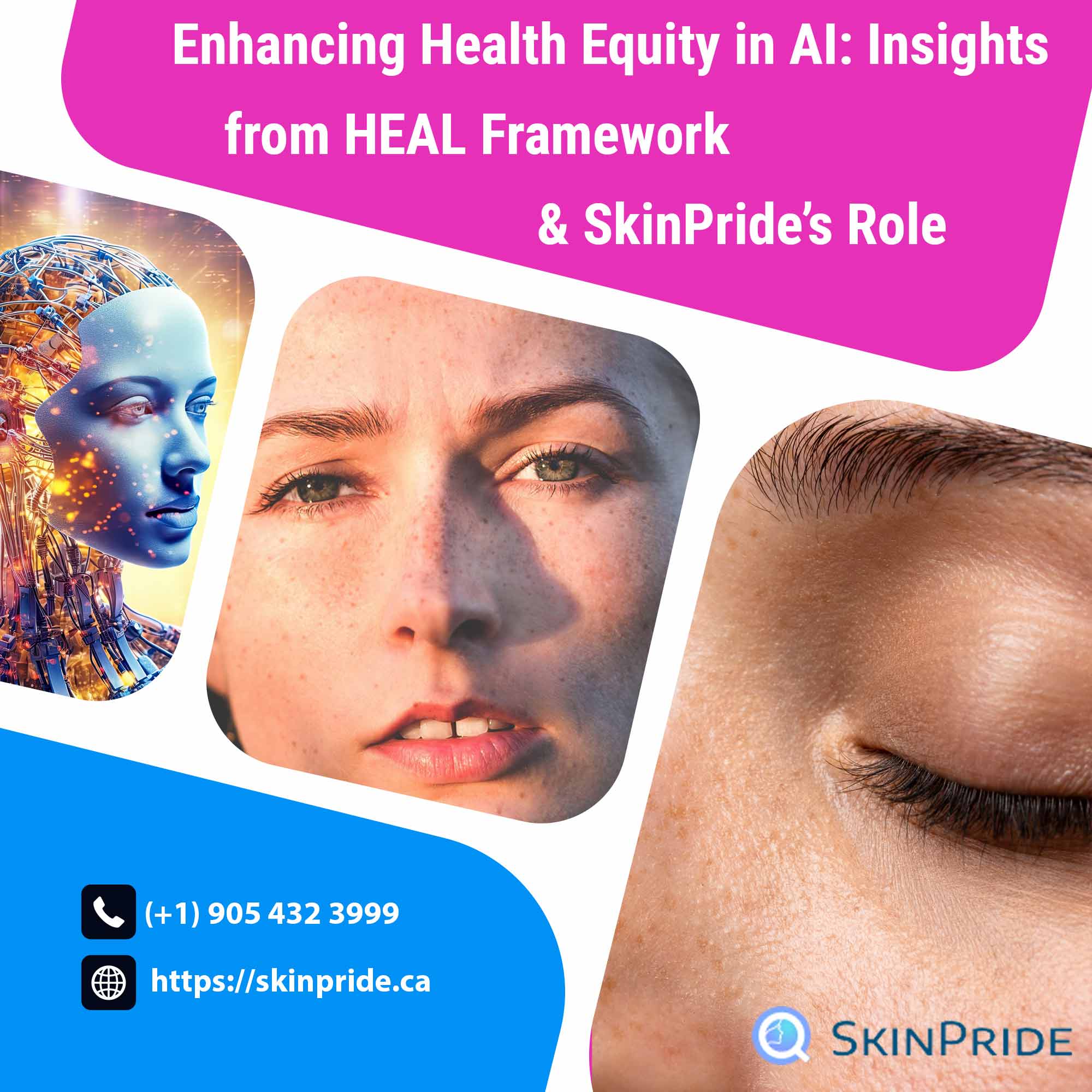Enhancing Health Equity in AI: Insights from the HEAL Framework and the Role of SkinPride
A recent publication discussing the Health Equity Assessment of Machine Learning performance (HEAL) framework offers insights into evaluating AI for fair performance across various patient demographics. This article examines the HEAL framework’s findings and investigates how SkinPride, a cutting-edge skincare application, embodies these principles to foster equitable health results.
Within the field of medical technology, artificial intelligence presents both opportunities and challenges for health equity. The AMA provides comprehensive resources and research on health equity, including how AI can impact healthcare outcomes and address disparities.
NIH offers insights and research findings on the use of artificial intelligence to address health disparities and improve healthcare delivery.
Insights from the HEAL Framework
The HEAL framework emphasizes three key areas: health equity, accessibility, and health literacy. These dimensions are vital to mitigating the risks associated with AI deployment in healthcare settings.
Ensuring that AI technologies cater to diverse populations is paramount. Disparities in healthcare often stem from systemic biases, which can be further perpetuated by algorithms trained on non-representative data. To enhance health equity, AI systems must be designed and validated with diverse datasets that encompass a wide spectrum of demographics, ethnicities, and socio-economic backgrounds. This means engaging in rigorous data collection practices that reflect the varied experiences and needs of all patients.
The HEAL framework also underscores the importance of making AI-driven health interventions accessible to all. Accessibility encompasses not only the physical availability of technology but also the usability of AI systems by healthcare providers and patients alike. The design of AI platforms should prioritize user-centered approaches that take into account the diverse technological proficiency levels among users. Training and resources must be made available to ensure that all stakeholders can leverage AI tools effectively.
Finally, the success of AI in healthcare hinges on the health literacy of its users. Patients must be informed about how AI systems work and how they impact their care journey. Educational initiatives must be developed to guide patients through AI-integrated healthcare processes, ensuring they understand their rights and the implications of algorithm-driven outcomes. Promoting digital and health literacy will empower patients to make informed decisions, fostering greater engagement and adherence to treatment plans.
The Role of SkinPride
SkinPride emerges as a pivotal player in the quest for health equity in AI, particularly within the realm of dermatological health. The initiative is dedicated to addressing disparities in skin health assessments and treatments by leveraging AI technologies tailored to diverse skin types and conditions.
SkinPride is committed to compiling a comprehensive dataset that includes images and information from a wide variety of skin phenotypes. This strategy directly addresses the issue of bias in AI algorithms. By utilizing data that accurately represents diverse populations, SkinPride can ensure that its AI systems provide equitable diagnostic and treatment recommendations.
SkinPride recognizes that achieving health equity requires collaboration across different sectors. By partnering with community organizations, healthcare providers, and technology developers, SkinPride aims to create a holistic platform that supports equitable access to dermatological care. These partnerships foster trust and transparency, ensuring that community needs are met and that the AI solutions are culturally sensitive and relevant.
In alignment with the HEAL framework’s focus on health literacy, SkinPride is devoted to educating patients about their skin health and the role of AI in enhancing care. Through workshops, informational resources, and user-friendly app interfaces, SkinPride empowers individuals to take control of their skin health journeys. This empowerment is critical in bridging the knowledge gap and fostering a sense of ownership among patients.
The intersection of AI and healthcare holds immense promise yet poses significant challenges concerning health equity. By employing the HEAL framework, stakeholders can proactively address systemic biases, enhance accessibility, and cultivate health literacy among patients. Initiatives like SkinPride illustrate the potential for AI to not only enhance clinical outcomes but also drive forward the crucial goal of health equity. Together, these efforts can help to construct a more equitable healthcare system for all individuals, irrespective of their background, ensuring that the benefits of technological advancements are shared widely and fairly.
How SkinPride Integrates AI for Personalized Skincare
SkinPride uses AI to analyze skin conditions and recommend suitable treatments. This technology ensures that skincare solutions are not only effective but also tailored to individual needs, which is particularly important for women over 30 who may experience varied skin issues. By incorporating advanced AI, SkinPride helps bridge the gap between general skincare advice and personalized care.
Evaluation of the Dermatology AI Model through the HEAL Framework
The application of the HEAL (Health Equity and Algorithmic Learning) framework in assessing a dermatology AI analyzer app offers significant insights into the intersection of artificial intelligence technology and healthcare equity. Drawing from an extensive analysis of 5420 teledermatology cases from diverse settings in the USA and Australia, the findings underscore the crucial role that a robustly diverse dataset plays in enhancing the effectiveness of skin AI technologies. This study not only sheds light on the model’s performance across various demographic groups but also emphasizes the importance of inclusivity in developing healthcare AI applications.
Emphasis on Diversity in Data
The significance of a diverse dataset—in terms of age, sex, and race/ethnicity—cannot be overstated when evaluating AI applications in healthcare. A well-rounded dataset serves as the foundation for ensuring that the model can adeptly cater to varying populations. The study’s results indicate impressive outcomes for particular racial and ethnic groups, showcasing a commendable HEAL metric of 80.5% when prioritizing performance based on Years of Life Lost (YLLs). Such results set a robust benchmark for future innovations in the field of AI analyzer apps, asserting a clear path forward toward achieving health equity.
Encouraging Outcomes: Areas of Strength
While the findings reveal sectors requiring further enhancement, they also highlight the promising levels of performance demonstrated by the AI model for certain demographic groups. This performance not only reflects statistical success but represents the potential for these skin AI technologies to markedly elevate health outcomes. Celebrating these strengths creates an optimistic atmosphere conducive to continuous improvement in diagnostics and treatment planning tailored to diverse populations. This acknowledgement of success is pivotal in advocating for advancements in equity-focused AI solutions in dermatology.
Identifying Areas for Improvement

The Role of Skinpride in Advancing Dermatological Care
The HEAL Framework: An Overview
The HEAL framework—a model focused on Health Equity, Accessibility, Literacy, and Advocacy—inhabits a critical space in the dialogue surrounding healthcare technology. It encourages stakeholders to ensure that innovations do not merely serve a limited demographic but instead address the diverse needs of all populations. Skinpride’s utilization of this framework is instrumental in guiding its development of AI-driven dermatological solutions.
Health Equity and Dermatology
A vital aspect of Skinpride’s mission is the promotion of health equity. Dermatological conditions often disproportionately affect racial and ethnic minorities, leading to biases in care and outcomes. By focusing on equitable AI models, Skinpride aims to enhance the representation of diverse groups within its algorithms, making accurate diagnoses and treatment recommendations accessible to all, regardless of their racial or ethnic background. Continuous research, inclusive data collection, and stakeholder engagement are necessary to ensure that the AI systems employed can robustly address the needs of underserved populations.
Promoting Health Literacy
Health literacy serves as a vital conduit between healthcare innovation and patient empowerment. Skinpride actively promotes education on skin health, enabling users to better understand their dermatological conditions and the treatments available. By providing clear, understandable resources and engaging users through interactive tools, Skinpride fosters confident and informed interactions between healthcare providers and patients. This empowerment can lead to improved adherence to treatment plans and more favorable health outcomes.
Advocacy for Change
Finally, advocacy plays a crucial role in the mission of Skinpride. The organization recognizes that advancing equitable healthcare requires systematic change at both the community and institutional levels. By joining forces with advocacy groups, healthcare providers, and policymakers, Skinpride seeks to influence legislation, reform outdated practices, and inspire ongoing discourse about the importance of equitable access to dermatological care.
Path Forward: Collaboration and Innovation
Future Directions: Collective Collaboration and Innovation
Looking ahead, the pathway toward fully realized inclusive AI-driven healthcare is fraught with challenges, yet it is also brimming with opportunities. Collective collaboration will be key in this pursuit. Skinpride intends to foster partnerships across industries, from tech innovators to healthcare providers, to continue refining its AI models for enhanced diagnostic accuracy and inclusivity. Furthermore, relentless innovation ensures that Skinpride will not rest on its laurels; continuous iteration and engagement with user feedback will guide its evolution.
Conclusion
In conclusion, applying the HEAL framework to the AI analyzer app in dermatology provides a robust foundation and inspires hope for AI’s future in healthcare. While the model has showcased commendable performance for specific racial and ethnic groups, addressing areas requiring improvement is vital for nurturing equitable outcomes across all demographics. The journey toward an inclusive and effective AI-driven healthcare system calls for collective collaboration, relentless innovation, and an unwavering commitment to health equity. Together, we can navigate this journey, enabling all populations to benefit from the advancements in healthcare technology.
Skinpride represents a beacon of hope in the dermatological field, combining cutting-edge technology with a steadfast commitment to equity, accessibility, literacy, and advocacy. By applying the HEAL framework, the organization enhances its service offerings and sets a precedent for how AI can be responsibly and effectively integrated into healthcare. The journey toward an inclusive and effective AI-driven healthcare system is indeed a collective one. Skinpride stands ready to navigate this promising path for the benefit of all populations, ultimately pushing boundaries and reshaping the landscape of dermatological care for a brighter future.
FAQs
The HEAL framework is a methodology developed to assess whether AI technologies prioritize performance for patient populations experiencing worse health outcomes.
SkinPride uses AI to analyze skin conditions and provide personalized skincare recommendations based on detailed analysis.
The study found that the dermatology AI model prioritized performance for certain racial/ethnic and age groups, though there is still work needed to address disparities fully.
AI can enhance health equity by offering personalized and precise skincare solutions that address individual needs and health disparities.
Future advancements in AI should focus on improving performance equity and refining tools to offer more accurate and inclusive healthcare solutions.
In promoting the importance of health equity in AI, we must encourage collaboration, innovation, and a relentless commitment to inclusivity in the healthcare ecosystem. The journey toward health equity is complex but achievable, and each step taken in this direction is a step toward a healthier, more inclusive future.

